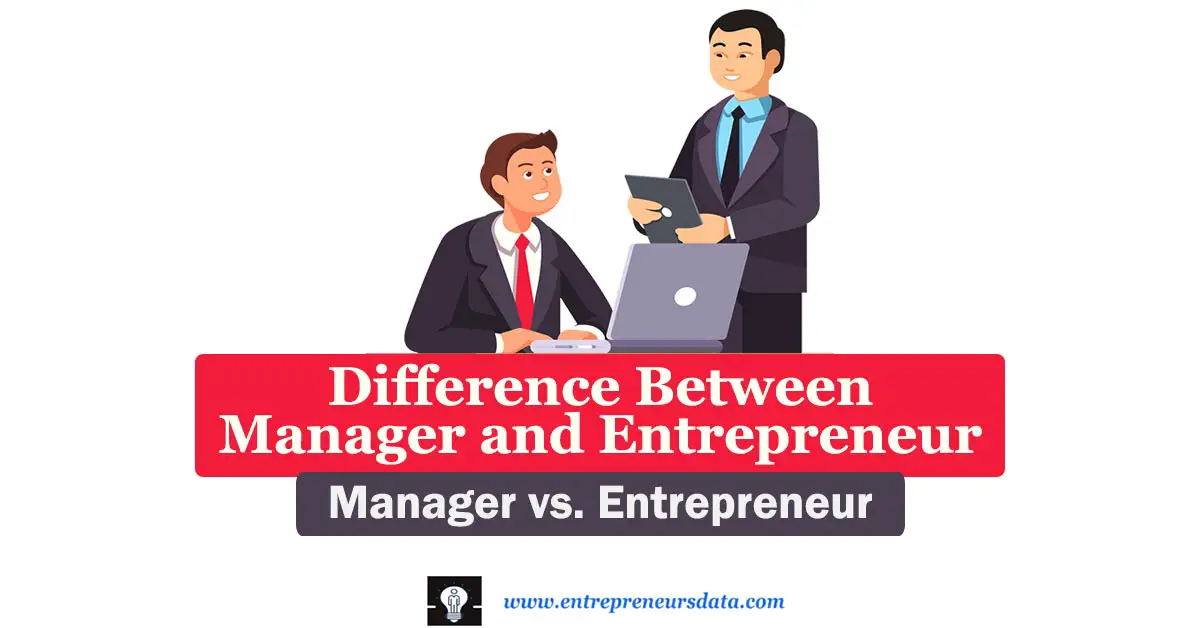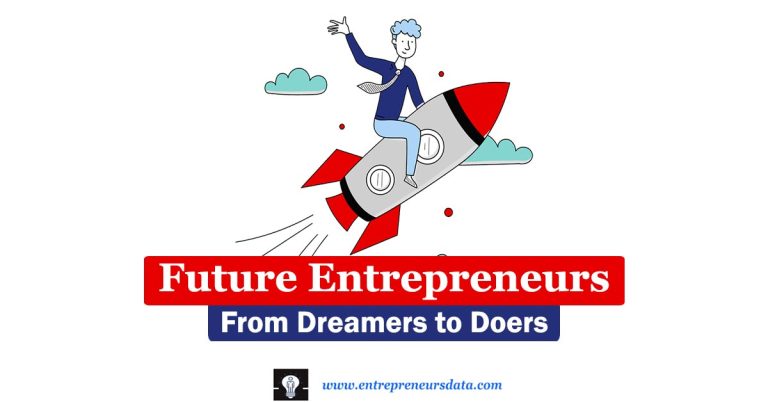Difference Between Manager and Entrepreneur – “Managers are hired to run the day-to-day business. The future is created by entrepreneurs”. This statement is captured by Veteran author and entrepreneur Steve Blank. Understanding the differences between an entrepreneur and a manager is like a captivating narrative of strategy, creativity, and vision in the fast-paced business world.
This article delves into the roles of managers and entrepreneurs. We define their roles, delving into their nuances. Also, comparing their roles to understand the symbiotic relationship between them and business success, ultimately providing insights into their roles.
Definitions Differences Between Managers and Entrepreneurs
Manager Definition
Latest Definition: According to the Society for Human Resource Management (SHRM) (2023), a manager is “an individual responsible for overseeing the work and performance of a group of employees. They plan, organize, delegate, and control resources to achieve organizational goals efficiently and effectively.”
Entrepreneur Definition
Latest Definition: The Oxford Business Dictionary (2023) defines an entrepreneur as “an individual who creates and manages a business enterprise, taking on considerable financial risk in the hope of profit.”
Manager Overview on the Difference Between Manager and Entrepreneur
Definition and Role of a Manager
A manager is the key to an organization’s success, bridging strategy and execution, leading teams, overseeing activities, and guiding the ship towards common goals through leadership, communication, and organizational skills.
Responsibilities of a Manager
Managers wear many hats, juggling a multitude of responsibilities that fall into three key realms:
Day-to-Day Operations
- Planning and organizing work: Allocating tasks and setting clear expectations.
- Resource allocation: Managing human, financial, and material resources for optimal efficiency.
- Monitoring progress: Keeping track of performance metrics to identify potential issues.
- Problem-solving: Analyzing, strategizing, and guiding teams through challenges.
- Communication: Engaging with teams, stakeholders, and superiors for a culture of transparency and collaboration.
Process Implementation
- Developing and implementing procedures for consistency and efficiency.
- Upholding quality standards and championing improvements.
- Ensuring growth through training and resources.
- Regular performance evaluations and constructive feedback.
- Fostering a positive working environment through conflict resolution.
Goal Achievement
- Setting SMART Goals: Specific, measurable, achievable, relevant, and time-bound.
- Motivating and Inspiring: Creating an uplifting work environment.
- Delegation and Empowerment: Building ownership through effective delegation.
- Team Building: Fostering collaboration and teamwork.
- Reporting and Analysis: Keeping track of progress and identifying improvement areas.
Skills Required for Effective Management
- Leadership: Guiding and inspiring teams.
- Communication: Clear and concise stakeholder communication.
- Organization: Efficient task planning and delegation.
- Problem-solving: Analyzing challenges and crafting effective solutions.
- Decision-Making: Making informed, well-thought-out decisions.
- Teamwork: Collaborating effectively and fostering positivity.
- Motivation: Inspiring team members to reach their potential.
- Adaptability: Flexibility in changing circumstances.
- Resilience: Persistence in adversity.
Read – Money Mindset Books
Entrepreneur Overview on the Difference Between Manager and Entrepreneur
Defining an Entrepreneur
An entrepreneur is more than a businessperson; they are visionaries who spot opportunities where others see challenges. These pioneers are the architects of their destiny, pushing the boundaries of innovation and reshaping industries. By identifying and capitalizing on opportunities, entrepreneurs bring fresh perspectives to the table, creating value that transforms markets.
Entrepreneurial Responsibilities Overview
- Identifying Opportunities: Conducting thorough market research and analysis to identify unmet needs and market gaps.
- Trend Spotting: Predicting emerging trends to keep ventures aligned with the future.
- Creative Problem-Solving: Using innovation to find innovative solutions to existing problems.
- Creating and Innovating: Developing new products or services, and creating business models for sustainable revenue and profitability.
- Building a Brand: Creating a unique identity to resonate with the audience.
- Market Response: Promoting offerings, attracting and retaining loyal customers.
- Operational Management: Balancing daily business operations and financial health.
Strategic Decision-Making in Entrepreneurship
- Define Business Direction: Define mission, vision, and values.
- Plan Long-Term Strategy: Plan for growth and success.
- Guide Resource Allocation: Make critical decisions for maximum impact.
- Calculated Risk-Taking: Assess risks and rewards.
- Comfort with Uncertainty: Embrace calculated risks and learn from mistakes.
- Adaptation: Use mistakes as lessons to refine strategies.
Essential Skills for Successful Entrepreneurship
- Vision and Creativity: Identifying opportunities and envisioning possibilities.
- Leadership and Decision-Making: Guiding others and making sound judgments under pressure.
- Business Acumen: Understanding business principles and financial management.
- Communication and Interpersonal Skills: Clear communication and relationship-building.
- Marketing and Sales Skills: Generating interest and attracting customers.
- Adaptability and Resilience: Overcoming obstacles and adjusting to change.
- Passion and Self-Motivation: The will to achieve in the face of difficulty.
Read – Role of Entrepreneurship in Economic Development
Head-to-Head Comparison: Difference Between Manager and Entrepreneur
A. Nature of Work
| Feature | Manager | Entrepreneur |
| Focus | Managing existing operations, ensuring efficiency, and achieving set goals | Creating and starting new businesses, identifying opportunities, and driving innovation |
| Activities | Planning, organizing, delegating, monitoring, reporting | Finding funding, building teams, developing products, marketing & sales, financial management, strategic decision-making |
| Outcome | Smoothly functioning and efficient operations | Innovative and successful business |
Managers focus on efficiency and goal attainment, involving meticulous planning, organization, delegation, monitoring, and reporting. They maintain smooth operations. Entrepreneurs, on the other hand, thrive on creation and innovation, securing funding, building teams, developing products, marketing, sales, financial management, and strategic decisions. Their ultimate goal is a groundbreaking, successful business that stands out in the market.
B. Decision-Making Contrasts
| Feature | Manager | Entrepreneur |
| Framework | Guidelines, policies, procedures, data-driven | Strategic vision, intuition, calculated risks, adaptability |
| Timeframe | Short-term, focused on achieving immediate objectives | Long-term, focused on building a successful and sustainable business |
| Impact | Predictability and stability | Growth, change, and disruption |
Managers operate within a structured framework, relying on guidelines and data-driven insights to ensure stability and predictability. They follow established routines and protocols, while entrepreneurs navigate a less-defined path guided by strategic vision, intuition, and risk-taking. Managers prioritize immediate objectives and efficiency, while entrepreneurs focus on long-term visions and adaptability. Managers aim to maintain predictability and stability, while entrepreneurs fuel growth and disrupt norms, creating a transformative journey.
Read – Goal-Setting in Entrepreneurship
C. Focus: Efficiency vs. Innovation
| Feature | Manager | Entrepreneur |
| Primary Goal | Operational efficiency and achieving set goals | Innovation and creating value |
| Approach | Implementing existing plans and procedures | Developing new ideas and solutions |
| Mindset | Analytical and detail-oriented | Visionary and creative |
Managers focus on operational efficiency, while entrepreneurs aim for innovation. Managers implement established frameworks, while entrepreneurs develop new ideas and solutions. Managers have an analytical mindset, while entrepreneurs have a visionary, creative mindset. Both focus on efficiency and innovation, respectively.
D. Risk Perspectives
| Feature | Manager | Entrepreneur |
| Risk Tolerance | Lower, with emphasis on stability and predictability | Higher, with a willingness to take calculated risks |
| Safety Net | Fixed salary and benefits | Personal financial responsibility for the success or failure of the venture |
| Reward | Steady income and career advancement | Potential for high financial rewards and personal satisfaction |
Managers have a lower risk tolerance, focusing on stability and predictability, while entrepreneurs are risk enthusiasts who take calculated risks for innovation and business growth. They have no financial safety net, and their satisfaction is based on the success of their venture.
Read – Technology in Entrepreneurship
E. Time Horizons
| Feature | Manager | Entrepreneur |
| Focus | Short-term goals and objectives | Long-term vision and strategy |
| Timeframe | Daily, weekly, monthly, quarterly | Years, decades |
| Outcome | Meeting specific targets and deadlines | Building a sustainable and impactful business |
Managers focus on short-term goals, while entrepreneurs aim for long-term visions and strategies. Managers have short-term goals and deadlines, while entrepreneurs focus on long-term growth. Managers’ success is achieved through efficient execution, while entrepreneurs focus on creating a lasting business impact.
F. Mindset Contrasts
| Feature | Manager | Entrepreneur |
| Preference | Structure, order, and predictability | Creativity, flexibility, and adaptability |
| Approach | Process-oriented and methodical | Experimentative and open to new ideas |
| Outcome | Maintaining the status quo and incremental improvement | Disruption, innovation, and creation of new markets |
Managers prioritize structure and order, while entrepreneurs embrace creativity and innovation. Managers follow a methodical approach, while entrepreneurs embrace ambiguity and new ideas. Managers aim for incremental improvements within established frameworks, while entrepreneurs seek disruptive outcomes and create new markets.
The Yin and Yang of Business Success: Finding Harmony in Roles
Complementary Roles
In the intricate dance of business success, managers and entrepreneurs perform distinct yet complementary roles. Think of it as a yin and yang – managers provide a stable foundation, ensuring the ship sails smoothly, while entrepreneurs bring the dynamic vision, innovation, and risk-taking spirit that propels the ship forward.
Balancing Managerial and Entrepreneurial Skills
For a business to thrive, a delicate balance of skills is required:
- Managers: While efficiency and stability are their forte, a dash of creativity and innovation can elevate their teams’ performance. Think structured innovation.
- Entrepreneurs: Beyond groundbreaking ideas, adopting managerial skills like planning and financial management ensures the longevity of their ventures. It’s about being visionary and practical.
Read – Global Entrepreneurs
Case Studies of Successful Businesses
Successful businesses often epitomize the synergy between managerial and entrepreneurial traits:
- Apple: Steve Jobs’ visionary spark, beautifully complemented by Tim Cook’s operational prowess, ensured iPhones reached hands efficiently worldwide.
- Tesla: Elon Musk’s innovation drive, paired with a team of seasoned managers, orchestrates the intricate dance of producing cutting-edge electric vehicles.
- Amazon: Jeff Bezos’s calculated risks and long-term vision, harmonized with robust management practices, turned an online bookstore into a global retail behemoth.
Evolving Roles in Different Business Stages
- Startup: In the startup phase, entrepreneurs wear multiple hats, blending both managerial and entrepreneurial skills. It’s about experimenting, adapting, and finding the winning formula.
- Growth: As businesses burgeon, the need for specialized skills arises. Enter experienced managers, the backbone of efficient operations and business scaling.
- Maturity: In mature businesses, the focus shifts to maintaining market share and profitability. Here, managers take the lead, optimizing operations and championing continuous improvement.
Conclusion
“In the spirited words of Elon Musk, the visionary force behind Tesla and SpaceX, ‘Managers are valuable, but entrepreneurs are the ones who change the world.’ As we conclude our exploration into the realms of management and entrepreneurship, the profound impact of these roles becomes crystal clear.
Through this article, we explore the differences between managers and entrepreneurs. We highlight their roles and the delicate harmony between them. Managers provide stability, while entrepreneurs inspire change. Together, they create a path for enduring success, combining the valuable contributions of managers and the transformative power of entrepreneurs.
People Also Ask
How do Managers’ and entrepreneurs’ personalities differ?
Manager: Organized, detail-oriented, team player, thrives on stability and predictability.
Entrepreneur: Visionary, creative, risk-taker, independent, thrives on challenges and innovation.
Think of it like a movie: managers are the characters who follow the script, while entrepreneurs are the ones writing it!
What is the difference between an entrepreneur and a manager for example?
Imagine a bakery. The manager ensures the ovens run smoothly, ingredients are stocked, and orders are fulfilled efficiently. The entrepreneur might invent a new bread recipe, open a new location, or build partnerships with local farms.
What is the role of a manager as an entrepreneur?
- Identifying and evaluating opportunities: Act as “intrapreneurs” to drive internal innovation.
- Taking calculated risks: Experiment with new methods or processes, balancing risk with team rewards.
- Building and leading teams: Foster creativity, encourage collaboration, and empower team members.
- Embracing change: Adapt to new technologies, trends, and market shifts for organizational agility.
- Serving as a bridge between routines and new ventures: Guide and support the entrepreneurial spirit.
















